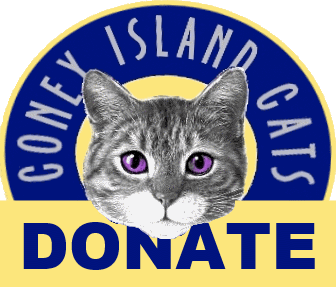

What is
Needed Next
What We Need:
-
TNR traps (drop traps and regular traps)
-
Carriers for kittens.
-
Blankets to cover the traps
-
Disposable plastic plates for food and water
-
Monetary donations for food, transportation, medical
What we have been finding and why we need donations:
-
Cats that are sick with upper respiratory infections
-
Kittens and Cats that are sick with eye infections
-
Kittens and Cats that are sick with bites from fighting
-
Kittens and Cats that are sick with injuries from living on the Boardwalk
-
Kittens and Cats that are sick with weather related illnesses
-
Cats that need care after surgery (recent momcats)
-
Cats that are sick with senior illness like failing kidneys
-
Cats that have endured so much that their bodies are generally failing them
-
Food for their time in foster care and Recovery
-
Other supplies like paper towels, trash bags, sanitizer for the traps and Recovery Room
After the initial TNR is finished the Pilot Program begins:
Colony Care:
All across the world, people are caring for stray and feral cats. Although roles that people choose to assume may vary, one thing remains consistent—people take great satisfaction in helping to improve the quality of life for cats.
Some people carry out trapping and ensure that the cats are vetted: they may or may not be the caregivers.
Others serve as both the trapper and the colony’s caregiver. In circumstances where there are several people involved who work or live in the vicinity, the cats may enjoy a team of caregivers.
Caregivers, provide food and water regularly and sometimes create shelters depending on the environment and if extreme winters or summers require additional protection for the cats. The caregivers provide something else that is critical: They give the cats a voice by educating neighbors and people who work in or near the colony’s territory. Education and in some cases, mediation, is an essential aspect of Trap-Neuter-Return and colony care.
Feral cats live in all parts of the country, in about every kind of climate and habitat. They find shelter and a food source because they are opportunists. Feeding and providing shelter for feral cats allows them to peacefully co-habitate in an area. While some people welcome them for rodent control, providing nutritious food keeps them both from roaming in search of a food source and also less susceptible to disease and parasites.
Caring for a feral cat colony has tremendous benefits to caregivers, neighbors, and the cats. Though cats have been living outdoors for over 10,000 years on their own, there are steps that a caregiver can take to promote their well-being, make them good neighbors, and assist the people who live nearby in understanding and co-existing with the cats.
With a Pilot Program in place an organized caretaker helps in the continuation of 1) Conducting ongoing Trap-Neuter-Return as needed. »2) Providing food and water. »3) Providing shelter. » 4) Monitoring members of the colony and provide ongoing health care. »5) Helping cats and people co-exist. »6) Planning for back-up colony care. »
The Clean colony sites will be an addition to the community that will be immediately appreciated.
